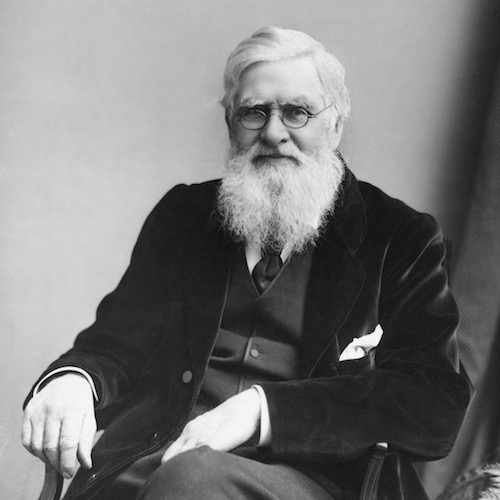 Evolution
Evolution
 Faith & Science
Faith & Science
 Intelligent Design
Intelligent Design
John West on Alfred Wallace and the Road Not Taken

Sadly it’s behind a paywall, otherwise I’d simply tell you to go read our colleague John West’s terrific essay in First Things, “The Church of Darwin.” West recounts some of the terrible currents in thought outside science that have flowed from Darwin’s theory. But he also shows that it didn’t have to be that way.
At the inception of the theory of evolution, Darwin and co-discoverer Alfred Russel Wallace represented two paths forward, one headed in the end to nihilism, atheism, and despair — basically, today’s ascendant culture — the other to a wondrous and hope-giving recognition that material stuff is not all there is in the universe. As Wallace argued, a source of intelligent agency lies behind the changing fa�ade of nature:
Wallace expounded his views at length in two scientific books near the end of his life: Man’s Place in the Universe (1903) and The World of Life (1910). He saw evidence of purpose in the functional complexity of the cell, the exquisite design of biological structures, and the rare constellation of physical factors that allows life to exist on the earth in the first place. “Everywhere, not here and there, but everywhere, and in the very smallest operations of nature to which human observation has penetrated, there is Purpose and a continual Guidance and Control.”
In our own day, Lehigh University biochemist Michael Behe and geneticist Michael Denton are prime examples of scientists who, like Wallace, see evolution as a fundamentally purposeful process. That they are regarded as beyond the pale by most current evolutionary biologists reflects the triumph of the metaphysics of Darwinism enforced by academic pressures of conformity that oppress dissent rather than consider evidence. The Church of Darwin is so narrow today that even the cofounder of the theory would have to be declared a heretic.
Let that sink in. If the co-discoverer of evolutionary theory were alive today, he would be attacked by the National Center for Science Education as a “creationist.”
John West observes that much of what we think of as “evolution” is perfectly compatible with a recognition of intelligent design in biology (not to mention cosmology). I would say that ID is a theory of evolution, just not a Darwinian one. Famed atheist philosopher Thomas Nagel and other have been reaching for their own alternative understanding of how biological complexity arises, an understanding that is neither ID nor Darwinism.
Dr. West sees in Nagel a reason for optimism that the path traced by Wallace is not lost:
Fortunately, in the world of ideas, there are second chances, and we may be experiencing one right now in debates over the nature of nature. In recent years, experimental studies have raised serious doubts about just how much innovation unguided processes like natural selection can actually produce. At the same time, continued discoveries of exquisite fine-tuning throughout nature — from the laws of nature that make life possible to the protein sequences inside our cells — have reopened vigorous discussions of purpose in nature among physicists, mathematicians, philosophers, and, yes, some biologists. One knows that something significant is surely afoot when a prominent atheist like philosopher Thomas Nagel can announce that the materialist worldview spawned by Darwinian theory “is ripe for displacement.”
The reaction to Nagel’s book, which Leon Wieseltier compared to a mob attack, proves its importance as a spur toward ongoing scientific thought as opposed to dogmatic catechesis. A story in Prospect magazine had to assure readers with its title “Thomas Nagel is not crazy,” while a notice in Wilson Quarterly bore the subtitle “Philosophers cast a notable dissenter into the outer darkness.” Darwinian atheism has become an orthodoxy, the contrary of scientific method. Doubters aren’t brave Galileos. They are heretics.
Given the ways in which evolutionary materialism has provided pseudo-scientific justifications for some of the most barbaric and inhumane social and political policies of the last century, I certainly hope Nagel is right.
It’s a sign of the times, an indication of the intellectual impoverishment of journalism and academia, that Darwin advocates are currently triumphant in convincing so many thoughtful people that evolution means Darwin, period, that Darwin is the only alternative to that ill-defined scare word, “creationism.” First Things deserves applause and thanks for reminding its readers that there is another way.
Image: Alfred Russel Wallace, by London Stereoscopic & Photographic Company (active 1855-1922) (First published in Borderland Magazine, April 1896) [Public domain], via Wikimedia Commons.
